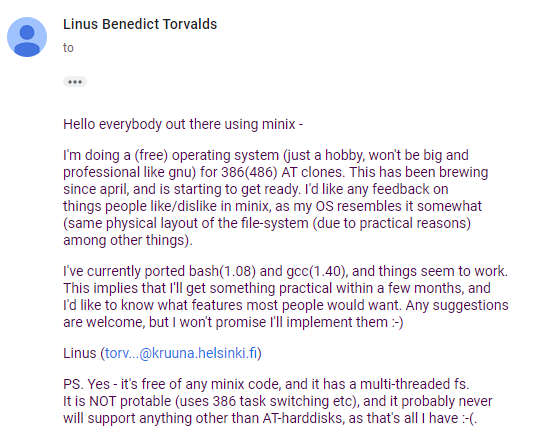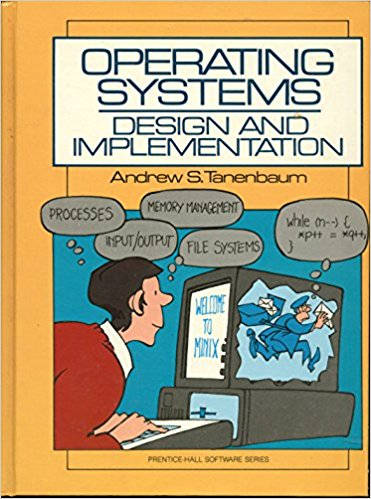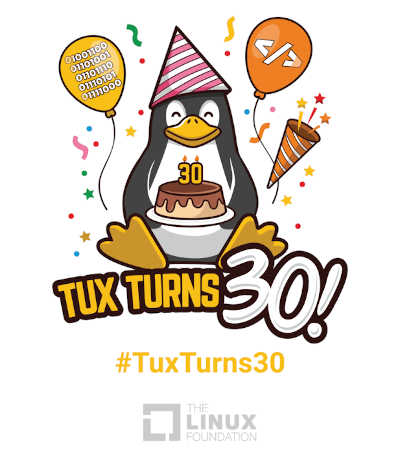| Linux Is 30 |
| Written by Harry Fairhead | |||
| Wednesday, 25 August 2021 | |||
|
Yes the number one open source operating system is 30 years old this month. Is it mature or geriatric? Why isn't it everywhere? After all, it is difficult to beat the economics of a free OS. The exact date to celebrate is usually the 25th of August 1991 because this is the date that Linus Benedict Torvalds broke cover with a post to the Minux newsgroup: It is nice to know that Linus got some things wrong: just a hobby, won't be big and professional like gnu Well we are still waiting for Hurd, the GNU OS. And what is this stuff about Minix anyway? Minix was an early attempt at creating a Unix-like operating system that wasn't encumbered by licences, but in practice it just wasn't liberal enough in its licence. At the time, Torvalds, then 21, was studying at Finland's University of Helsinki. He'd learned about Minix from Andrew Tanenbaum's book Operating Systems: Design and Implementation and, at the beginning of 1991, bought a 386-based PC clone, installed a copy of Minix and started work on his one-man cloned operating system. He graduated in 1996 with a Masters degree having submitted a thesis titled Linux: A Portable Operating System. Even today there is an argument about the extent to which Minix led to Linux.
If Tanenbaum and his publishers had really adopted FOSS principles instead of wanting to make a profit on any serious use of Minix outside of education then we might well have been celebrating the birthday of Minix. However, even Linus was slow to catch on to FOSS. The original version of Linux wasn't open source software. It was free but was distributed with a license forbidding commercial use or redistribution. However, for version 0.12, released in 1992, the GPL was adopted, making the code freely available. You almost certainly know the rest. Linux became a really big hit when the Internet took off and web servers were needed in bulk. Given that Linux had an excellent web server what would you choose? An expensive Windows Server or a free Linux Server. It proved even more of a no-brainer for server farms where Linux could be installed without having to worry about licences or licence management. And so it is today. Linux dominates the server but not the desktop. It does dominate the mobile phone market, but only well hidden underneath the software mess that is Android. Why doesn't the logic of free sofware apply to the desktop? There are so many reasons. Perhaps the main one is which version of desktop Linux are we talking about. In this case there may be just one Linux, but the possiblities for the desktop splits and confuses the market. If only Linus would bless one of the possiblities then things might change. So is Linux mature or geriatric? Your view on this depends on your position. If you are an OS purist then Linux isn't a microkernel-based OS and as such it is so last century. If you are a programmer then you have an extensive system that is constantly outgrowing its documentation. If you don't believe me try writing a Linux module - there is the documented way and then there is the way that follows the modern facilities of device tree and so on. I doubt Linux will ever be either mature or geriatric - it simply changes too much to be either.
More InformationRelated ArticlesLinux At 30 - A Penguin For Your Thoughts Linus Torvalds On Linux Past, Present and Future Linus Torvalds Receives IEEE Computer Pioneer Award To be informed about new articles on I Programmer, sign up for our weekly newsletter, subscribe to the RSS feed and follow us on Facebook or Linkedin.
Comments
or email your comment to: comments@i-programmer.info
<ASIN:1871962633> <ASIN:1871962641> <ASIN:1871962617> <ASIN:187196265X> |
|||
| Last Updated ( Wednesday, 25 August 2021 ) |




